The MSI MEG X570 Godlike Motherboard Review: Thor's Flagship
by Gavin Bonshor on August 28, 2019 12:00 PM EST- Posted in
- Motherboards
- AMD
- MSI
- 10G Ethernet
- Ryzen
- PCIe 4.0
- Ryzen 3000
- X570
- X570 Godlike
- MEG
System Performance
Not all motherboards are created equal. On the face of it, they should all perform the same and differ only in the functionality they provide - however, this is not the case. The obvious pointers are power consumption, but also the ability for the manufacturer to optimize USB speed, audio quality (based on audio codec), POST time and latency. This can come down to the manufacturing process and prowess, so these are tested.
For X570 we are running using Windows 10 64-bit with the 1903 update as per our Ryzen 3000 CPU review.
Power Consumption
Power consumption was tested on the system while in a single ASUS GTX 980 GPU configuration with a wall meter connected to the Thermaltake 1200W power supply. This power supply has ~75% efficiency > 50W, and 90%+ efficiency at 250W, suitable for both idle and multi-GPU loading. This method of power reading allows us to compare the power management of the UEFI and the board to supply components with power under load, and includes typical PSU losses due to efficiency. These are the real world values that consumers may expect from a typical system (minus the monitor) using this motherboard.
While this method for power measurement may not be ideal, and you feel these numbers are not representative due to the high wattage power supply being used (we use the same PSU to remain consistent over a series of reviews, and the fact that some boards on our test bed get tested with three or four high powered GPUs), the important point to take away is the relationship between the numbers. These boards are all under the same conditions, and thus the differences between them should be easy to spot.
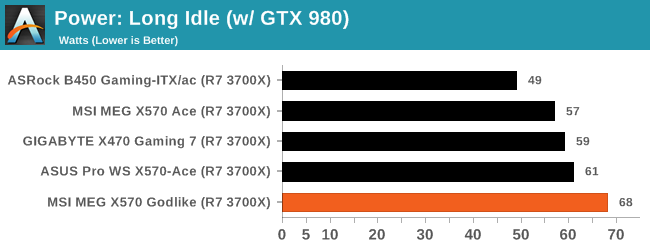
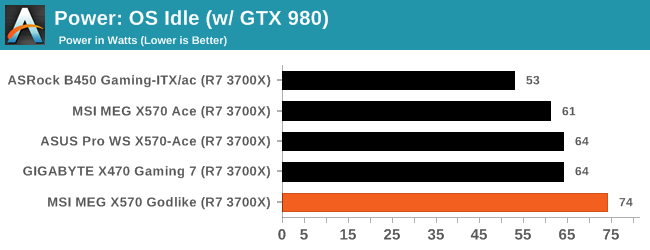
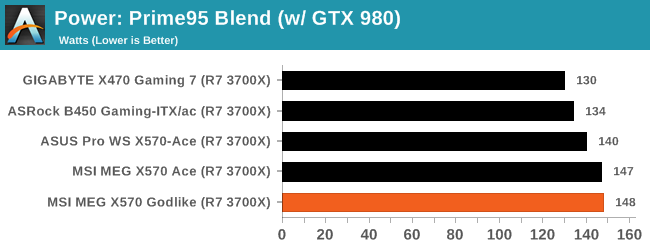
The power consumption at full load is marginally higher than the MSI MEG X570 Ace by a single watt, but in both idle and long ide power states, the power consumption is considerably higher. The larger PCB and bigger controller set are contributing factors.
Non-UEFI POST Time
Different motherboards have different POST sequences before an operating system is initialized. A lot of this is dependent on the board itself, and POST boot time is determined by the controllers on board (and the sequence of how those extras are organized). As part of our testing, we look at the POST Boot Time using a stopwatch. This is the time from pressing the ON button on the computer to when Windows starts loading. (We discount Windows loading as it is highly variable given Windows specific features.)
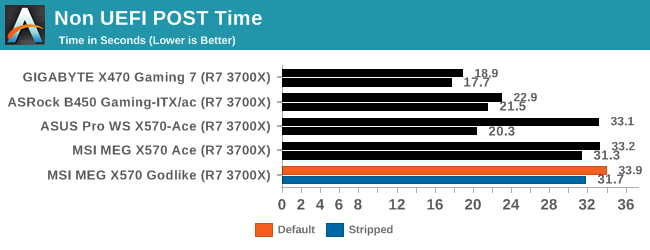
As with the MSI MEG X570 Ace model, the MSI MEG X570 Godlike also has extremely long POST times both at default settings and with controllers switched off. We did manage to make the POST time quicker by over two seconds by switching off networking and audio controllers, but this remains disappointing in comparison to other models tested with our AMD Ryzen 7 3700X processor.
DPC Latency
Deferred Procedure Call latency is a way in which Windows handles interrupt servicing. In order to wait for a processor to acknowledge the request, the system will queue all interrupt requests by priority. Critical interrupts will be handled as soon as possible, whereas lesser priority requests such as audio will be further down the line. If the audio device requires data, it will have to wait until the request is processed before the buffer is filled.
If the device drivers of higher priority components in a system are poorly implemented, this can cause delays in request scheduling and process time. This can lead to an empty audio buffer and characteristic audible pauses, pops and clicks. The DPC latency checker measures how much time is taken processing DPCs from driver invocation. The lower the value will result in better audio transfer at smaller buffer sizes. Results are measured in microseconds.
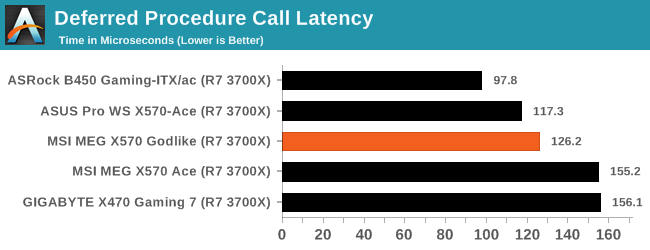
We test the DPC at the default settings straight from the box, and the MSI MEG X570 Godlike does perform noticeably better than the MSI MEG X570 Ace. The ASRock models do tend to have the upper hand when it comes to out of the box DPC latency.










116 Comments
View All Comments
inighthawki - Saturday, August 31, 2019 - link
If your monitor cannot display more than 75hz, then having a framerate about 75hz cannot make it any smoother. The display will scan out one image every 13.3ms, no more, no less. However, rendering above 75hz can make it feel more *responsive* because the image being scanned out can be more recent. This is due to the reduced latency. Perhaps you are confusing the two concepts? Otherwise if it appears smoother it could just be the game itself causing enough single frame stuttering (while maintaining and average greater than 75) that makes things less noticeable at higher framerates.>> but as you mentioned.. could be cause of the games i play, dont need it.. i assume, then, you play a lot of 1st person shooters ?
Yes I do. Other games are not as noticeable - many I can play perfectly fine at 60fps without an issue. However fast paced games like Overwatch are very difficult for me at anything under 144. My goal is to also switch to the 240hz panels once the 1440p panels are available.
Peter2k - Thursday, August 29, 2019 - link
Just because 1 in a million gamers would play at 720p at all, especially after forking over major cash, does not mean its a realistic scenarioinighthawki - Thursday, August 29, 2019 - link
My point wasn't that his scenario was realistic. He's suggesting that the only time this would be an issue (i.e when the CPU would be a bottleneck) is if you bought a mediocre CPU and spent a ton on the GPU, to which I said, is not true. Many games benefit heavily from single threaded performance on even the highest end CPUs when you're trying to hit very high framerates.It's great if the people here like to play at 4K ultra settings and get 60fps but there are a lot of people who prefer framerate over quality. Hitting 144hz or 240hz on the lowest settings in many titles is quite taxing on the CPU.
Qasar - Friday, August 30, 2019 - link
" Many games benefit heavily from single threaded performance on even the highest end CPUs " and that performance, is tied to the cpu's IPC, so the frequency a cpu can get.. isnt the be all tell all of performance. " but there are a lot of people who prefer framerate over quality " and there are also a lot of people that prefer quality over frame rate, point is ?inighthawki - Friday, August 30, 2019 - link
Performance is based on IPC and frequency, not just IPC. A CPU that already has a higher base IPC *and* can overclocking the frequency much more has a huge advantage in single threaded performance scenarios.>> and there are also a lot of people that prefer quality over frame rate, point is ?
I never said those people are wrong. I've been being told throughout this discussion that my decisions are stupid or wrong because it's what I care about. If people prefer the quality then more power to them, I'm happy they're getting what they want.
Qasar - Friday, August 30, 2019 - link
" A CPU that already has a higher base IPC *and* can overclocking the frequency much more has a huge advantage in single threaded performance scenarios. " then explain why Zen 2, while clocked 600 mhz slower is with in a few % of the intel equivalent. which is because Zen does more instructions per clock, then intel does at the moment. again.. the frequency a cpu can get, isnt the tell all, be all when it comes to performance.. look at the P4 and A64 days.if Zen 2 were to clock higher, then its quite possible, the performance would be in amds favor across the board.
inighthawki - Saturday, August 31, 2019 - link
Youre misunderstanding what I'm saying. I didn't say "greater frequency == greater performance". You should go back and re-read my posts.Qasar - Saturday, August 31, 2019 - link
thats how it sounds, cause thats how you seem to have worded it.. to get higher IPC, the freq the cpu runs at, also has to go up.. but thats not necessarily the case, and with Zen2, it does more work per clock, compared to intel, which is is while clocked slower, the performance is close enough, its not worth the extra cash that intel charges, in the case of the 9900K vs 3800X the price difference is a $150 difference, personally, id rather save that 150, and put it towards a better vid card, or something else, or get the 3900X for the same price as the 9900k. its also probably a safe bet, that if Zen 2 could reach the same clocks as the intel equivalent, then the question is, based on performance and price, why buy an intel cpuinighthawki - Saturday, August 31, 2019 - link
>> the performance is close enough, its not worth the extra cash that intel chargesAnd that's where we seem to disagree. The performance is not close enough. If we were talking a completely negligible give and take scenarios of 1-2fps that would be one thing. But many gaming benchmarks show the 9900K still having a 5 if not 10% upper hand in gaming scenarios. When my goal is hitting 144 or even 240fps in games, that is definitely not performance I'm willing to let go.
I'm not calling Zen2 a bad CPU lineup. The 3900X is a fantastic chip and meets the requirements of many people. Just not me. I don't need core count, I need maximum single threaded performance. I don't care about the dollar per clock per watt or anything like that.
Qasar - Saturday, August 31, 2019 - link
yep, then thats where we disagree... but that 5 or 10%. IMO.. isnt worth the price of the 9900K cause just the cpu alone is 150 bucks.. AND you NEED a mid high to high end cooler for that 9900K to reach those clocks, and sustain them add another $75 + to that, if the $200 premium is important to you, then by all means.. for me.. no thanks..